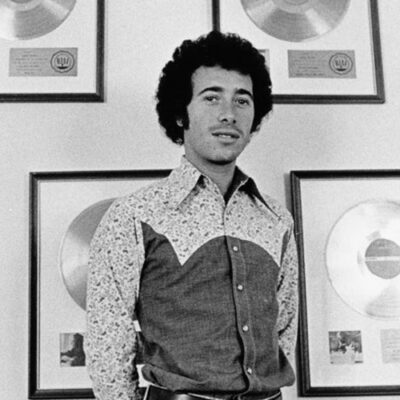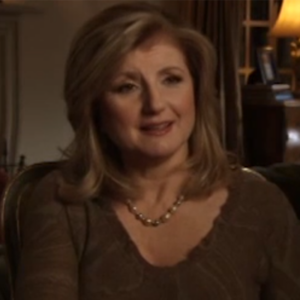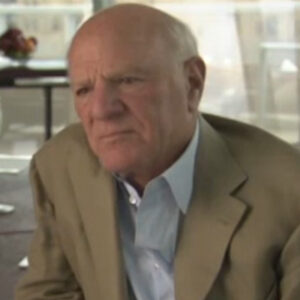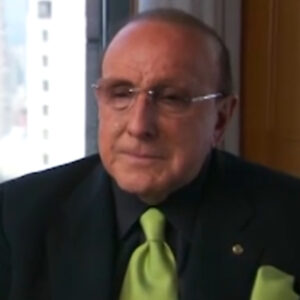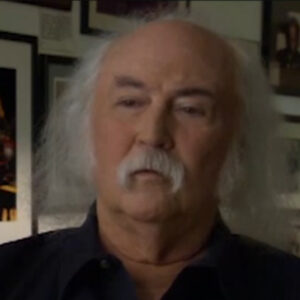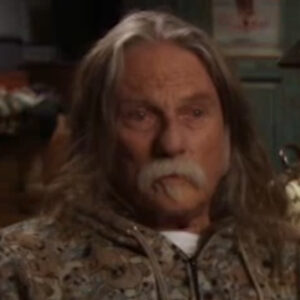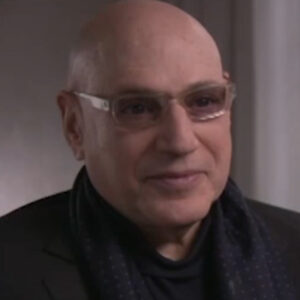Speaker But I would actually really like to talk about the early days that what you know about him, what reputation.
Speaker He was a success. He’s a millionaire by 20 something. What’s the price you pay for success that early?
Speaker I mean, I didn’t know David really well in his youth. We’re both from Brooklyn. What’s different? High schools, different neighborhoods, but similar backgrounds from Brooklyn. I didn’t know him in the early days of the music business. I knew he was a great acolyte of Steve Ross and admired Ross. And one of the traits that Ross had that I think David tried to emulate was the sense that you cannot overpay for talent, that you have to make people feel good who are talented. And when when there was a hostile takeover or attempted takeover of Steve Ross’s Warner Brothers by Herb Siegel and her people complain you’re spending all this money on planes and flying. Steven Spielberg and Tom Hanks and all these actors and directors is crazy. And Ross would say it is not crazy. If I can get a movie out of Steven Spielberg, who is my friend, by the way, or we’re going to make a lot of money for Warner Brothers, David ingested that and believe that and idolized Ross.
Speaker They had some tough negotiations because the other part of David that you knew from an early age was that he is one tough poker player. And and and at one point, he turned on Steve Ross. So he’s he’s a complicated character. But I think the impresario part of Steve Ross rubbed off a little on on David. And I think David, you know, appreciates that and appreciates how you have to nurture and court and and hug.
Speaker Tell him why we’re in it. So you just you just can’t screw it up because it covers a period of time.
Speaker But first of all, Steve saw something, David, and he stood by him time after time and people were ultimately fired. Film jobs. Why do you think at the end of the day, he didn’t sell his. I mean, he made the NCAA deal instead of selling what you know.
Speaker But I don’t know enough to know. I’d just be guessing. I don’t know.
Speaker So what do you know that they’re following you?
Speaker You know, they’re very different. They were different types, people. I mean, Ross was not a confrontational list.
Speaker David is a confrontational list. Ross did not have had a control temper. He never let it get the better of him. He was he was tough, as David is tough. But he was not mercurial. He was not. Go to the mattresses and let’s have war. That’s David. And if David feels wrong, as he obviously did in the Ross case, he goes to the mattresses.
Speaker What I’ve heard is that he was really pissed off that day that Steve didn’t let the merger. And he did let Steven Spielberg dittos stripe’s.
Speaker He felt left out that it was left out of left out of the knowledge, if it were left out of the participation or financial participation. They certainly didn’t know. And I think that’s. Well, you know, you can imagine why that might be true. You could say that.
Speaker Yeah, I could imagine why. Ross Steve Ross might be reluctant to share certain information with David Geffen. Geffen is very well plugged in. Guy who talks and likes information is power. And so information became one of the many tools of his power. And and I’m not saying David would have told had he been told by Steve Ross about it, but that would have been a risk. I think Steve would have been wary of taking.
Speaker Let’s talk about what part of David that would see that as a betrayal. He’s a real Old Testament guy and eye for an eye. He’s a huge believer. Loyalty. He showed it. So it was kind of a turning point.
Speaker Yeah. Be humiliating, too. I mean, to have his friends like Steven Spielberg know something he didn’t know, instantly communicate or he would feel would communicate that Steve. Trust me. But he doesn’t trust you, David. And that would infuriate David, who infuriate most people and and particularly someone as proud as a peacock as David is. So, you know, I can understand why he would be hurt and feel betrayed by that, particularly since he felt he had given his loyalty to Steve and he felt this was not reciprocated. And if you climb inside as Steve Ross’s head, I suspect what he would have said is that it was too risky for me to to share that information with someone as well-connected as David who and maybe he would have said I suspect he wouldn’t have said, but he probably felt David maybe has a big mouth.
Speaker Some people say he knows how to keep the secret.
Speaker Well, you see, that’s the interesting thing, because, I mean, there are. He has any number of cases over the years where he’s kept secret. And part of his brilliance as a negotiator is that he keeps his cards close to his vest. So it’s not like he’s not in control. He is. But, you know, one of the things that is always striking and when you I remember sitting at David’s house in California at very early one morning, and of course, it’s three hour time difference there.
Speaker And people are calling him early in the morning from New York and then from California.
Speaker Their first call in the morning is to check in with David and and not just to check in, but to share information. And so I’m once I was doing a piece on Burt Fields for The New Yorker and I was interviewing David and David, of course, as you know. And I’m sure we’ll get into it as a real herup, as knows about Michael Ovitz. And. And he was on the warpath. One of many war pets he’s been on. And and he was just collecting information. So I would hear from David in the morning, you know, about rumors, about what’s going on. Michael Ovitz could be in trouble.
Speaker But above, in terms of Burt Fields, Anthony Pellicano case, and and it would then I would talk to various people as I’m going around interviewing him in L.A. and they would they would literally almost word for word and say what David had told me. And I realize all circular. He was like the AP wire of Hollywood.
Speaker You really get it. You raised it. Just one example. He was zero.
Speaker Somebody that he didn’t really didn’t like the whole city. What’s your perception, Mike?
Speaker Oh, I think it was big. I think. I think David was the campaign manager for. For those who detested Mike always felt he was manipulative, greedy, kind of shady. Not I mean, in a criminal sense. I mean, the sense of leaking information about people and basically a warrior out there. And David set out to combat Michael Ovitz and his influence. And I think he had a lot to do with his failure. And if you go back over to the sides, first of all, he he he helps sell MCI a two to Bronfman profit. And then once Michael Ovitz to be his CEO, the company Ovitz, as as he sometimes did over, negotiates and demands too much, basically was saying to Edgar Bronfman Jr., you know, you bought the company, but it’s mine. I’m going to run it. And then Branfman every right to say, what skin do you have in this game, buddy? And he realized he had negotiated too much. So he goes over this thing, goes to Ron Meyer, and Ovitz was really offended by that. Then his best friend, Michael Eisner Oval Office was desperate to get out of out of the agent business. He felt like he was a big deal. And yet he had to get on a plane and take the red eye for someone’s client’s birthday party. And it deeply offended him. He thought it’s beneath him. He can’t get to the point where he was Michael Ovitz. I shouldn’t be doing this. I’m not a service business anymore. I should be a buyer. So that’s why he wanted to run a studio and be a buyer and deal with agents and shuffle them off and stuff like that. So his friend Michael Eisner was desperate to get an executive he didn’t want to give. Job to David’s good friend, Jeffrey Katzenberg. So he he jettisons Jeffrey, which automatically puts makes David his enemy, Margolyes his enemy.
Speaker But then when he hires Ovitz, it’s a double insult. So he has two enemies. He’s out on the warpath to kill. And Ovitz goes in and becomes a CEO. And he did something similar, what DMCA?
Speaker He basically tried to take authority that I’m I’m not quite in charge from Michael Ovitz, but basically push the envelope of his power there, even though he was only number two. And Michael Ovitz gets very unhappy with him. Fed by and David is on the circuit. The AP wire is going like crazy. I mean, everyone knows the latest news about always was.
Speaker I remember writing about Ovitz and and Eisner of the failed marriage and and and before that, some maybe a year before I’d written about the failed marriage between Eisner and Katzenberg a couple of years before that. And in both cases, David was a great source on the record. I mean, it wasn’t I’m telling a tale out of school here, but if you wanted to know anything negative like all of this or Michael Eisner, you start with David Geffen. Was he justified? Well, you know, as a journalist, you always want to pass things and you always want to say when someone is as rabid as David was and as black and white as David was, you always kind of step back and say, whoa. I mean, is he got all good. But he had a lot of great information. And, you know, the thing I always liked about David dealing with him as a journalist, I always found him straight. I mean, if he hated you, he hated you. And there was no, you know, baloney, you know? Well, you know, on the one hand, he hated Michael Ovitz and he didn’t hide the fact that he hated he hated Michael’s. And you can hide that fact. He had a lot of people and he never hid that fact. And sometimes he would get like Opus one of the reasons he hated Ovitz with nothing to do with Jeffrey Katzenberg. None of it’s I’m sorry. One of the reasons he hated Michael Eisner and had nothing to do with Jeffrey Katzenberg is that he thought Eisner was not philanthropic. And David is very philanthropic. And he would give to these things and he would send letters to to Istar. And Eisner would either ignore them or make a very minimal contribution. And it drove David crazy. I mean, once having dinner, what not. It was a lunch interview with David and he was talking about Eisner. And that’s what he talked about and talk about Katzenberg and and talk about over interpret. He talked about how cheap he was and it really offended his sense of justice.
Speaker Do you ever read this story? I think it was some kind of an event honoring Katzenberg, actually, and everybody else was right there.
Speaker Jackson and I didn’t want to get 25000 paid out over a three year old. Somebody said, oh, my God, it’s embarrassing.
Speaker Don’t matter. We’ll take care of it. Don’t worry. We’ll take care of it. But I can I can totally understand that. What’s the common denominator? Do you think, in what he did, apart from the lack of philanthropy that would make David?
Speaker If he feels they did an injustice to a friend of his and and that was true of Katzenberg, one of the stories he he put on the AP wire, and I should call the AP wire because I’m offended. I’m slurring. The Associated Press. But one of the stories he put on on the on the Geffen wire was what Ovitz did with Ron Meyer, his former partner and co-investor and CAA and a very popular man in California. In the studio world, Ron Meyer confided in his friend Michael Ovitz that he had this he saw this great house in Santa Monica that he loved and over to tell me about it. So he told Ovitz about the house. And it’s a little bit apart on price, but I think we’ll get it. And then according to the story, which David Geffen gleefully told Michael Ovitz went behind Ron Myers back, went to the real estate agent or the owner and up the price and bought the house after looking at it. And Ron Meyer and Michael Ovitz, former partners, don’t speak and haven’t spoken since then. And so always made another very powerful hit me there. But but that story was retailed by it, by David Geffen as an example of why he thought Ovitz was not to be trusted. And it goes back to loyalty. He felt it was an act of this loyalty as he felt. You know, he was this law. Ovitz was this loyal to other people and the Hollywood community that Geffen cared about. So loyalty is is a ingredient. A second ingredient that you throw into the stew is is if he thinks you’re a phony. I mean, ultimately came to think Bill Clinton was a phony and it offended him because he’s not a phony. He’s he’s a straight shooter. He has flaws, but he’s not phoniness is not not among the flaws he has. So that that matters. And he thought Ovitz was a guy who smiled with a with crooked teeth. And and so that offended him, felt the same. But Eisner felt the same about Bill Clinton and other people. And so those are certainly two things that go in to what determines whether you’re on Geffen’s right side or wrong side.
Speaker It’s something very smart. I mean, in this sense of honor that he has, which I think. Gives him permission to do the things he does because he feels that he’d be here.
Speaker I think he does. I think I think his code of conduct is admirable. I mean, he thinks, you know, he’s not a guy who who is, you know, buying extravagant things. He has a opulent boat and obviously a house and beautiful art. And but he’s not conspicuous consumption. That’s someone who shows off his wealth that way. I mean, his house in Los Angeles, I think is almost beautiful homes ever seen. And the art is so beautifully hung. And I just think it’s very tasteful. And I think he has good taste. And I think that matters to him. And I think he he’s just a guy who who sees himself. I want to get out of the business and I’m going to get out of the business. He makes that announcement and he does get out of the business. So for him, he’s living by a code. And the code when he announced he’s gonna do something, he does it. And I think that’s how he views her. But I think, you know, it’s like, you know, there are mafia guys who, you know, go to church every Sunday and make major contributions to the church and then go out and do some pretty brutal things. They’ve done some pretty brutal things as a murder. Anyone? Not not literally. But, you know, if you talk to Michael overseas, thanks. He was, you know, almost murdered by Michael, by David Geffen.
Speaker Well, not to dwell on it, but what are a few other examples of things? It’s just not going up.
Speaker I wouldn’t mind if he did. I’m just trying to think, though.
Speaker When we talk of brutal things. David Stone.
Speaker Well, he you know, there was a guy named Tom King who he had agreed to. He was a Wall Street Journal reporter. He got a contract to write a biography of David. David agreed to cooperate on the bio. Tom King was a good reporter, went about, you know, doing, interviewing, etc. And at some point, David came to feel that the king was going to savage him. I don’t know that that’s true. And I I’ve been told it’s not true by King’s friends. He just was doing what any reporter does, which is ask some tough questions as well as pleasant questions. And David, it may it somehow ignited David’s paranoia. And and he just cut him off. So he was a guy with a book contract for David and authorized not authorized me. They was going to see it. But he was going to cooperate. And suddenly he lost that cooperation and it harmed him. Tom King died seven years later. I’m not really linking the two, but he was a very depressed guy after that experience. And so I thought that was pretty, pretty rare. And David, you know, when he makes up his mind, there’s no Supreme Court appeal here. I mean, he just done over. I don’t wanna talk about anymore.
Speaker Let’s talk about that. That quality, that relentless quality that I will go to Matt for what I believe in quality when it comes to covering the story.
Speaker Well, I’m from the Brooklyn streets. I hope I don’t. So many great quotes. Somebody said the reason Hollywood is, is it’s high school with money. David’s the principal of that school. Yeah. That’s setting a lot for. That’s good play.
Speaker Oh, I think that is true. I mean, I think they. I think David. I think David. David has left Brooklyn a long time ago. But Brooklyn didn’t leave him. And I think he is a guy who who who loves combat. He loves a fight and he doesn’t back away from it. He’s a guy on a Brooklyn street, you know, wouldn’t want to get in a fight because he’s small and they’re big, tough guys on those streets. But but David does it with his mouth, not his fists. And he does it with his money. And his mouth is a blowtorch. I mean, it is a really powerful instrument. And and it’s an instrument that plays, you know, it’s in many different ways. I mean, he first of all, he talks to the press. Many reporters use him as a good source in Hollywood. That’s a valuable asset for someone who and somebody won’t talk to. And some will cut off as we describe, you know, The Wall Street Journal reporter who’s down to do the biography. But reporters who will talk to he unloads a tremendous amount of information.
Speaker And I was just stunned at the number of people, the Alan Grubman’s, the Ron Myers, you know, studio heads who call him every morning and they just gossip. And David will say, well, what what’s what’s going on? And Groopman or Mya or whoever will tell him the latest things they’ve heard. And he will tell them that. And then he’ll ask a question. And Alan or someone else said, I’ll get back to me, check on. That’s a good question. I don’t know. And he spends an inordinate amount of time doing this. Now he has the luxury of time. I mean, just a job per say. So it’s David is is like, you know, there’s a little bit of him. That’s the little Parsons. I mean, that that is you know, he is Gossip Central and and he loves it. And he really enjoys gathering all that information. And and some of it is true, but it is not to stop him. And you, as a reporter, when you’re talking, you have to pass out what’s true and what’s not. But he’s a wonderful interview. I mean, you just long term, if you’re doing a story in Hollywood, if you don’t make a stop at David Geffen, you’re making a big mistake because you’re going to learn something. And now some things you’ll learn are not true. And, you know, you wind up discarding him, but he’ll give you some leads that are just fabulous and some and some scenes that are just fabulous and some anecdotes that are just fabulous. So it’s a joy to talk to him.
Speaker I really enjoy it. I asked you before I started this project where you’re going to do this. What is it? Well, I trust you. As David said, we met each other twice. I’ve seen you work.
Speaker You told me that. And I believe that’s that’s true of my. I think, you know, but I think he he trusted Tom’s work in The Wall Street Journal. Tom covered Hollywood. And obviously, David was a very good sort. So what made him turn on Tom that way? Now, I don’t know, it may be I don’t know what David’s version of that is and maybe the David that Tom really made a mistake.
Speaker I’ll tell you my theory, which is not going to be quite the film. He hadn’t come out and understood it. Yeah, he was drawn into that. He was just very uncomfortable. He wasn’t ready for that.
Speaker Makes sense. That makes sense. I guess I heard that, too. And I just forgot.
Speaker I mean, I know I know some things I can’t tell. David told me how he knew this, but it has to do with certain people taping certain conversations and sending them to you. And he said, my brother’s off limits. And he went and I did not know why. OK, that’s interesting. Brother’s dead now, right? He won’t talk about his mother. You were talking about mother.
Speaker I don’t have that kind of relation with where we talked about. But, you know, he he is one of the things that that that you remind me of when I think about him dealing with him as a journalist, talking about how he honest and and and he is. And, you know, I remember when Maureen Dowd wrote a very influential column in the in the 2008 election in which she quoted David as saying why he didn’t like the Clintons and why I was going to support Obama. And he said some really rough things about what phonies he thought the Clintons were. And Maureen was at his home when he said that she called him back and said, David, I want to use that if I said it. Go ahead and use it. And then when she used it and it caused firestorm stories in other papers, et cetera, David didn’t do it. A lot of people do when they’re when they’re, you know, they get caught and they become the controversy. And he has to answer for his what he said in the press. He didn’t disown Marie. He didn’t deny that he had said it. He backed it up. And he said he said it. And that’s what I feel. Period. And I thought that was extraordinary because there were lots of pressure on him to denounce the reporter and he didn’t do it. And I’ve just found in my dealings with him and it’s been a lot over the years. I mean, you know, just on stories I’m working on that he’s straight and he may be wrong about things, but he’s straight. And and I’m I.
Speaker I agree. Why do you think that gave its opinion about the Clintons carried weight at all?
Speaker Well, first, there he was. He was one of his biggest backers in Hollywood, both financially and culturally, bringing them and making them part of that community. He slept in the Lincoln Bedroom like a lot of other wealthy people. Did he ask favors of Clinton, like a lot of people did, including for, you know, you know, a pardon for someone he wanted to put in American and then later we’d been convicted. He he went to White House dinners and was vetted by Clinton. He was treated like a Mocca by Clinton. And people knew that. And it was it also had a period of time that was important in that Obama was just beginning to. Clinton was still Hillary Clinton was still much favored in that race to win the nomination for president. But Obama was starting to gather some steam. And the thought that one of Clinton’s mockus would would, in fact, reject them and go with the upstart Obama was a big deal.
Speaker You know, it’s pretty extreme. Yeah. You think it turned the tide anyway? No, I mean, I overstated.
Speaker I mean, I think David might like to think he turned the tide. But no, I don’t think. I don’t think Hollywood people turned the tide in any election.
Speaker But I think it was it was a a very significant event. It was debilitating for the Clintons. Put them on the defensive for several days. It was a jolt in favor of Obama. And and it it you know, it was just and it gave David a lot of press, which he probably loved.
Speaker I mean, Maureen says that he said, I don’t think I care what I said or the other. I’m not sure that he’s that modest. But he she thought he was. He said he was genuinely surprised.
Speaker Oh, I think he was. I don’t think any question you had to be first of all, who would not be surprised by that impact? It was a page one story and people would not have suspected, you know, even the biggest narcissist in the world would suspect be a page one story for several days, not just one day. So I think he was surprised that. Did he enjoy it and they love the fact that was on page one. You betcha. As Sarah Palin would say.
Speaker So why would presidents call David? Why was Clinton calling?
Speaker Well, David is at the nexus of power in Washington. There is no I mean, Lou Osmond was a great power. I am sorry. David is at the nexus of power in Hollywood. Lou Osserman at one point in time was the kingmaker, the rainmaker. And so if you were running for office or you wanted to settle labor disputes, you went to Awesomer. And for a period of time, Michael Ovitz arguably was that less in the political realm, but certainly in the Hollywood realm of power, bringing studios together, packaging, you know, for movies. He was he was a major player. And then there was a vacuum. And David became became in many ways the most powerful figure in Hollywood, not because he ran a studio. I mean, DreamWorks, which he until 1980 was 2008. He was one of the three partners. But DreamWorks was not a major studio where the six others are. But he was a guy with press contacts. He had political contacts. He can get anyone on the phone. And because he he was feared by people in Hollywood, they feared his mouth. They feared his money. They feared his venom. That he had enormous amounts of power out there. So if you’re Bill Clinton and you want to you want to bring together the Hollywood community. There were many better choices than than David Geffen. One of the reasons David feels a sense of power with this quiet empowerment, but a sense of I don’t think he feels entitled, but he feels the right to speak out. And and and step in is that he has time. He has the luxury of time. That’s his job. I mean, this I have a real job now. Mean his job is is is policing Hollywood and and and checking up on things and pushing, you know, his charities and helping his friends and punishing his enemies. And does he sometimes go too far? Yeah, he does. I mean, when I would sit with him with with on the mike Michael Ovitz, I mean, he would just he would say these things.
Speaker They would just off a wall. Untrue. I mean, he believed them, but it wasn’t true.
Speaker And was all but it was partly he believed them because he wanted to believe them. And, you know, you then have to, you know, scrape off, you know, the stuff that’s not true. And but he he takes things very far. I mean, he just he wanted to legally kill. Michael Lovas, he wanted to legally kill Michael’s. And that’s that’s him. He is that way.
Speaker There’s an interesting paradox in David, which I don’t know whether you can address and you may not feel comfortable addressing it, but here’s a man who lives his life place by the kind of oath of loyalty. He gives it to his friends and he expects it back and he has chosen over it. I mean, people to talk about this. He did not have a good relationship with his father. He did not respect was an intellectual and a dreamer. But his mother was the breadwinner. That’s a problem for him. And he chose carefully. Very powerful father figures over the years starting with it. Well, I guess first then he switched on because there’s much more interest in the club. And then.
Speaker And he and after that, I don’t think after its steep rise and he ended up in some way not being loyal.
Speaker I think I think because he if he can’t comes to feel or came to feel that each of them betrayed him in some way and violated his code. And that was unacceptable. And Steve didn’t share information with him. That was a betrayal of their friendship. And and I don’t know what happened with Ahmed. I mean, what that figure was about.
Speaker Well, I think it was just more. Well.
Speaker It’s complicated. He wanted to. Well, what happened was that all this was all these different stories. It was not there. That’s what I think that’s what it really felt.
Speaker You know, David, you said that George Trow piece for The New Yorker. It’s an amazing piece.
Speaker David thought that they were close. Might want to model himself. That, of course, a very different guy came from a wealthy back. Swingtown art table manners, I think, you know, and. And he was you know, and I think that’s there’s some truth to that. That’s a shame. I’d forgotten. But he you know, he also jockeyed within that company for power all the time. And he will tell you, get lost.
Speaker This is not a nice. We don’t know. Not nice.
Speaker Yeah, he is. He is perfectly capable of not being nice. But but he justifies it.
Speaker You know, in his mind that he was wronged. And and and I think that.
Speaker And if he feels that way, he he goes pretty extreme. I mean, in trying to you know, that Brooklyn and him comes out and he wants to kill that person. I mean, I, I you know, there are people who who who do it for sport.
Speaker I remember years ago I did a profile of Roy Cohn, and I’m not comparing David Geffen or Roy Cohn at all, or Ken was actually the most egregious insect I’ve ever I’ve ever written about and spent time with. But he loved the idea that he was a legal executioner, that he could use the law in divorce and other things to kill the other side and love to talk about it. David, David is not that way cause Cohn would cut corners. And if David doesn’t cut corners, David operates unethical. Well. But the venom that the passion with which he approaches an issue where he thinks he’s dealing with an enemy is excessive and sometimes scares you. I mean, it’s so excessive. And and I thought that in interviewing him about Ovitz. I thought that about interviewing him, about Eisner. He just you know, he was operating on a code and he had conviction. It wasn’t fake, but it was too intense. It wasn’t healthy.
Speaker He sees himself as is the truth teller in a false land, a land based on fake reality. And it is sort of the self-appointed role in that, which I find very interesting because there are other ethical people in the business. But he’s the self-appointed crusader.
Speaker But I think David David, there is a lot of phoniness, a lot of kissing on the cheek, and then this afterwards in Hollywood. And David’s not a kiss on the cheek. And then this. I mean, he is straight and he’s not a phony. And a lot of phonies out there as there are in New York. I mean, just. But probably more so there, because you’re dealing with talent and you’re trying to bring people in. And I’ll never forget, you know. I once interviewed Michael Eisner and he said, you know, he wouldn’t pick a movie with with some director ever. And that night we read a New Yorker event and he was there and the director was there. And Michael Eisner, him, he said, hey, what am I going to make a movie for me? And I look and he looked at me like he never said. Even though he knew I knew. He said, you know. But David Geffen would never do something like that. That’s phoniness. That’s fakery. And and so I think there is a side of him that is repulsed by the Hollywood community and a side of him that enjoys lording it over the Hollywood community and not being like them, not going to their cocktail parties, not kissing people on two cheeks, not whispering someone. Michael, always hear a whisper and is an enemy. Doesn’t whisper. He shouts. And that’s what he’s like. But, you know, he also the other thing I was thinking about, there was a point in time when the Los Angeles Times was in trouble and and they were cutting. They had severed their first editor and they brought in Dean Baquet, who was the managing editor, and he was Seiffert. And then they fired. The publisher who defended Dean Baquet and they were losing, starting to lose money in circulation and advertising was dropping. And David Geffen wanted to buy the L.A. Times. And he said, I don’t care if it loses money. It’s a community resource. I would like I want to preserve it.
Speaker And he was moved by what you thought were really honorable motivations to do that. And and I remember talking to him and and I said, what would you do with the L.A. Times if he got.
Speaker He said, well, I would I would just really I would try and hire. I would try. And I’m Maureen Dowd. I would try and hire Alexandra Stanway. I would try to hire the best writers in the in the country and bring them out, bring him out here and or fill the time.
Speaker Give me a platform. Be great. And I said and he said I’d do more investigative reporting. And I said to him, well, what if your investigative reporters are doing a story about Jeffrey Katzenberg or one of your friends and they reveal some things that might be they might not like might be embarrassing in some way?
Speaker Well, I wouldn’t like that. That they shouldn’t do that, you know? And I’m just saying. Hey, wait a second. What about journalism, buddy? You know? And so there’s a part of David that had not thought that out. And it was interesting to me that you don’t hear it all. L.A. Times, I think we’d love to sell but can’t find a buyer. And David Geffen is not raising his hand to buy the L.A. Times and take a loss. And I think the complications of doing that are severe. I mean, it’s not it is not just being a mark of being, you know, sitting up on your phone and learning all the latest gossip and hiring people who you think you’re really good. But it’s causing pain. Journalism causes pain, too, and it caused pain for some of his friends. And I think he would feel disloyal if he did that. Well, you shouldn’t be in the newspaper business if you feel disloyal.
Speaker You raise a really interesting point, David. He is maybe the smartest thing. This is not really strategic or systematic thinker.
Speaker He operates on his gut rather than his brain because that makes it very, very much more like the early Hollywood Bowl and the current sort.
Speaker And I think that was part of his appeal.
Speaker I think I think I think David Geffen is a gut go with your gut guy and you live in a world where everything is is is done by market research. And Geffen, like Bill Paley, like Dick Sarnoff, like Steve Ross was a gut guy like Rupert Murdoch. Gut guys, they’re not guys who are analytically as brilliant as, say, John Malone as were some other people that the media mogul well might be. They they are instinctual. They’re animalistic in a way. They’re animals in the jungle and they see something. I think it’s prey where they see something they love and they’re not afraid. They have the courage and the security to say, I love this, though I’m not going to wait for market research to tell me. I love it. I love it. Steve Jobs is that way in all the all the new Apple products introduced over the years, the iPhone, iTunes, I bet. Whatever, Mac. None of them was ever subjected to a market research test because he made the argument that the public can’t know what they like until they’ve seen it. And you can’t predict what they’re going to like until they’ve seen it. Maybe years ago, Brandon Tartikoff, who was a gut guy, head of NBC programming, who had a lot of success, but early on he didn’t have success and he had a partner who was his boss, Grant Tinker. And it was 1984 and and it was no comedies. Sitcoms had been on the air. They’d all fallen out of favor. I Love Lucy. All those were gone. And The Cosby Show was was done for NBC that year. And Brent, talk of told me that of all the programs, pilot programs they had ever done, certainly that year, the lowest rated one with the public was The Cosby Show. And he loved it and Tinka loved it. And he went with it, going with his gut. And in fact, it was a humongous hit. And the lesson of that, he would say, is that the public, when they went in to see The Cosby Show in the pilot and then in the market, in the theater with the knobs and stuff like that, it was all new to them. First was a black family, but two was comedy with with laugh tracks, which you had had. Long time so was unfamiliar and it felt alien. It felt far so it rated very low in the market research. But in fact, it took off. And you’ve got to be it will stay with it. And, you know, so David has that gut that you have some examples of where you think he’s gone with his gut.
Speaker We see. I think he went with his gut with DreamWorks. I mean, I don’t think he was the the the a gut guy when it came to. Do we like Lion King or not?
Speaker Or the animation series. Katzenberg was on that. On the animation side. Spielberg was on the movie side. And David is comfortable enough and no pretense that the Jeffrey Katzenberg knows animation better than I do. Steven Spielberg knows movies better than I do. They’re my partners. That’s why I’m I’m their partner. I’m the business guy. I’m going to help them figure it out.
Speaker But what his gut was, was that my gut is that we can build DreamWorks into a successful company. And but by relying on the gut of Jeffrey Katzenberg and the gut of Steven Spielberg and the two billion dollars he raised.
Speaker Yeah.
Speaker Yeah. And then he went out because, again, his ties and his ties are based on the fact that he didn’t just make his money by selling his company. He’s invested very wisely and he’s multiplied his wealth. So the Paul Islands and people like that who who think I want to be in business with David Geffen because he’s a rainmaker. And also they want to be in Hollywood. And David played that vanity side of people. Paul Allen, I mean, it’s kind of a joke.
Speaker I mean, Paul was a shlumpy nerd and made a lot of money at Microsoft and. But he wants to be a player in Hollywood. Come, come, Paul. Come get. Leave your checkbook on the table. And he entertained Paul and he knew that. And he made it. And he probably learned some things, some pull out. Paul is not no dope, but doesn’t know anything about the Hollywood business. Certainly. But David knew how to raise and tap money.
Speaker There was a point. I mean, DreamWorks didn’t take off immediately. It was a point. I understand. Paul, I want to take you back. And that was very annoying. Kind of gave we all die.
Speaker I don’t. But.
Speaker But it sounds like we’d rather die.
Speaker No, it sounds like, David, we’d rather die than fail. It totally sounds like him. I don’t specifically remember that one, but I do know over the years that Alan had gotten cold feet a number times and ultimately sold. And he was.
Speaker But but, David, it’s actually illustrative of another point about David, which it’s not just part of his power is the power of his success as a financial. Success as a rich man who has multiplied as well. And people want to be associated with that because they want to get richer. And and they also want to be associated with Hollywood. And David played both of those. That was the lure of fame.
Speaker What were you. Were you in did you cover DreamWorks?
Speaker No, I wrote about Jeffrey and wrote about David and the Eisner Jeffrey thing. But no, I did not.
Speaker I didn’t write about DreamWorks. Was there a sense in the industry that DreamWorks might fail? Oh, I wanted it to fail.
Speaker I think that’s a I question whether people want to DreamWorks to fail is probably really complicated. I don’t think they want Steven Spielberg to feel feel. Jeffrey is is a more polarizing figure in Hollywood.
Speaker And on the other hand, what worked for Jeffrey’s advantage? Jeffrey is also a straight shooter. And and and people didn’t like Michael Eisner. So there’s a natural reason to root for Jeffrey. And David as a way of diminishing some Michael Eisner’s clout in that community. Clearly, people felt that Jeffrey was wronged. I think that was a consensus view in Hollywood. Jeffrey was wrong by Michael Eisner.
Speaker And and in that sense, they sided with David and Jeffrey. But DreamWorks was never perceived as a major studio and partly diminished by the fact that Spielberg would make some of his big movies for other studios, not for DreamWorks, which didn’t please. You know, Jeffrey and David, though, they kept their mouth shut because, you know, he’s the golden man. You don’t want to offend him, but they were offended by that, even though they didn’t mouth that concern. So that was that was. But but there were times where DreamWorks was trying to sell itself and studios wouldn’t buy maybe because David was over negotiating and wanted too much money.
Speaker And then they split up, as you know.
Speaker Did anybody that make Indian money? I think it didn’t work.
Speaker Yeah, I. I don’t remember that quite well chronologically when he brought in the money just for.
Speaker Let’s talk about that moment that studios started. I mean, that was kind of explosive in a new studio, the first one in 60 years. You think anybody could have that off?
Speaker Well, you needed Spielberg in there. And Katzenberg. I mean, they’re no slouches. I mean, Katzenberg was known as a as as a very successful movie guy and certainly a very successful, you know, animation guy. Spellberg is the most successful director in Hollywood and in the world. And and David is one of the most successful investors, certainly in Hollywood. And the combination of those three was instantly credible. You could not ignore. You couldn’t say, well, no one’s created creative studio in X number years. This was Geffen, Spielberg and Katzenberg. So people paid attention to that. And and so, you know, they did very well. I mean, David didn’t lose any money on that deal.
Speaker But the uniqueness is I do think this is a great guys and they’re great business guys and they’re great investment banker guys. But nobody encompasses all three except I think.
Speaker Yeah. I think David is an unusual business brain. I mean, while he’s a man who goes with his gut, he remembers figures really well. And and he has a capacity to really do you know, that computer in his brain does a pretty fast tally of the numbers of of a deal.
Speaker And and a B, he is a really tough negotiator who again holds his cards close to his vest. So you don’t want to play poker with David. And and he’s made a lot of really good deals over the years because of that talent. So I think he has an unusual mix of the skill that the really good investment banker has to keep numbers in your head and negotiate. The businessman who is tough and draws a bottom line of the smartest business people are people who say, I won’t go above this price. I won’t sell below that price. I won’t buy above that price. Take it or leave it. And then never looks back. And David said, take it or leave it. And then he doesn’t relive it and torture himself. And I think the really successful businessman know that and do that. They move on. And David moves on now. He doesn’t move on the way some other businessmen do in that he forgets. Because if he feels like you have somehow done him wrong, he moves off from doing business with you but doesn’t move on from trying to arm you. He will and he won’t forget. And we’ll just stay on. And that’s part of the nature of his power. Part of it, people fear him. And and and it’s and they’re reason to fear him. I mean, he is a fearsome guy.
Speaker Where he’s at once I give him time. The most beloved guy in Hollywood.
Speaker But, you know, he also is a guy who who I mean, he has these these odd relation. I mean, he gets very close to people like Sue Mengers and then somehow Sue does something he thinks is wronged him. We’ll talk to her. He won’t talk. Then they they kiss and make up at some point. But he holds grudges and he has a lot of grudges with people who he then makes up with. But then he has grudges against people, actually, and I quote, grudges is the right word for people.
Speaker Who makes up with, you know, hatred is the right word for people who doesn’t make up. And he has both. And so he goes through periods where he holds grudges and the people are off a list and we won’t talk to them. And people come say, well, you should sue. This is crazy, David. I mean, I’ve heard that story.
Speaker And no, I’m not. I don’t know. And then, you know, that’s where I come back.
Speaker I do speak before your wife, Sandy Galit, one of his best friends.
Speaker It’s about nothing. That’s what it’s about. I’m sure that all of those things were about nothing. And and it is high school. Most of the foods in high school are about nothing. And, you know, it just is not always was about something. Eisner Food was about something, you know, eyes. If he’s still if he’s back being the dear friend of Sandy Allen or Barry Diller or assuming his which he is, it was about nothing.
Speaker So a little slight. I really don’t know.
Speaker I don’t know either. But they were stealing someone’s decorator. Yeah. Yeah. Yes. Joycean had a big fight. He stole her cookery show. So the housekeeper, Donna. Oh, I forgot.
Speaker But, you know, we were talking about honesty.
Speaker And I just one other thing I want to just tack on about is honesty that I really like. I talk about people who kiss on both sides of cheek and Hollywood and then. But one of the things that that I’ve done any number of stories where I’m doing a profile, Harvey wants thing once and and some of the people I interviewed would call Harvey after the interview and tell him, you know, Canaletto really ask some tough question. He’s really look into this. So then I would see Harvey because I was doing multiple interviews. And you say I have you told I’ve been named the person, you know, which you shouldn’t have done. But he did. And that thankfully did because I don’t trust these people anymore. And and he would he would say, I hear you stole someone so that that you’re out to get me. Or so I said. I didn’t say I wouldn’t say that to someone, you know, on the risk that we get back. Also, I’m not that way. And but he would say, I hear you asked about so-and-so. And then it’s happened a number of times on other stories in Hollywood. And that suggests the fakery that often goes on there. Because I mean that. I mean, I can’t imagine. No, I don’t know many people who would do that. I mean, it’s so you know, it’s so craven because it’s really about trying to win favor in this case with Harvey and not about the truth and as also a way of trying to harm a journalist. That’s not their intent. Intent is to win favor with Harvey, but using the journalist as a vehicle to do that and therefore potentially harm me. Which is really kind of scary. Now, I was I mean, I’ve never been able to confront any of these people about because I was told and compress, but I don’t talk to them. I have a little gift to me, too.
Speaker Look, I think we. All right.
Speaker Let’s the Brooklyn you know, people always I know this is really hard to answer, and it might be, but people always talk every day. David’s always the smartest guy in the room. What makes him the smartest guy?
Speaker I don’t know that David is the smartest guy in the room. He is, you know, first of all, in all in a Hollywood room, he might be the smartest and certainly financially, I can understand why he would be the smartest player in many Hollywood room, financially, decisively, his decisiveness. I can understand why he would be more decisive than many people in that room. But if you’re in a room where you’re talking about literature, David wouldn’t be one of the smartest people in the room. If you’re talking about if you’re in a room where you’re talking about government. David wouldn’t be one of the smartest people in the room. And so there are a lot of rooms. He would he would be quiet. And and. But is he smart? Yes. And and he’s not. I wouldn’t put him in that in that class without. I’m not diminishing his brainpower. I’m just saying that that he is not a he’s not a renaissance man.
Speaker But he is trying to become in some way. He does read voraciously. Not just that he visits newspapers for videos, their oatmeal, but he reads a book a day. I think he is really voracious reader and acquire knowledge. He has an unchanged line, but he’s an acquirer of knowledge. I do think that that that there was a real turning point in his life at some point after the Kanzaki I thought to die. Nothing that I never thought he was going to have a colostomy bag. It didn’t think it was going to die.
Speaker That’s like an exaggeration that he faced.
Speaker Death came out on the other side, which some people like to tell that story that it’s not. But I think he there was a time when he he had to contemplate that. But I think he looked at himself and said, I always like what I’ve seen. Do you think there was an effort to tame the monster, as he put it? And I guess one day. What was the turning point in his life? He said he became a morning person instead of a night person. Just really interesting. You you for being a guy with Studio 54 E.T., right? Actually, that’s good. You know, being different. And I think part of that analysis daily for 20 years, est Lifespring, Merian Leaves was some kind of a search for something not quite clear what it was really wanted. Which you heat up, could take the rough edges.
Speaker I don’t know.
Speaker I don’t know. I don’t know David personally that way. I mean, I. I don’t know about the reading, for instance, that’s new to me. I am where the baby said about the morning person. Very much true. You can see that. And and he clearly was more contemplating. I mean, he’s a very serious student of art. And you could see that. And when he would take you around, when he took me around once his home and you know, the art and describing it and why he thinks a certain way and left them a certain way. It was really, you know, what do you with the Jack Warner? I was quite it was really kind of interesting. And you were talking with a man who knew architecture and knew art. So but I’m not aware of him reading a book a day. And and I’m not denying it. I just don’t know it. And he’s not a pal of mine. I don’t pal around with I like I enjoy him when I see him. But when I pass.
Speaker Well, some of these are OK. I actually did ask him how accurate. I mean, there are many people who don’t want to go on record.
Speaker We want to talk about David and Sammy Glick in the same sentence. How accurate do you think?
Speaker Do you think there’s any that David David Geffen is the least Sammy person I could think of. I mean, Sammy Glick was a. Was a network or a guy who ingratiate himself to people who said whatever he thought would please them. That’s not David Geffen. David Geffen is in your face. And if he you know, he’s not a networker at all. Like so many.
Speaker I mean, it is not a positive. So what do you think?
Speaker People made SANZEL Atlanta sematic to me, frankly. I mean, it’s almost typical. I mean, this little short Jewish guy. I mean, it must be Sammy Glick. I mean, I think that’s crazy. I mean, I think anyone who says that really doesn’t know David or has such a an animus towards him that they wished to ascribe that quality to him.
Speaker But I don’t it doesn’t ring true at all to me over the years when you’ve gotten to have bed with David so you could talk to you about the early days of the music. I mean, obviously, his biggest influence has been in the music business. You know, the views I felt about how he looks back on it. I’m just curious.
Speaker I really I am almost zero empty on the on David’s early years in the music business. I really don’t know. I don’t I can’t recall any substantive conversation with him about that period of stop my conversations with him all 90s on.
Speaker So DreamWorks? No, before DreamWorks. But so what?
Speaker What brought you you first together?
Speaker Luss first story. It’s a great source. I’m trying to number. I started writing.
Speaker I’m trying to think with I talk to him. I didn’t talk to him. I wrote a book on the television networks, go through by mice that came out in 91, but I didn’t. And that was about a five year project. But I don’t think I ever talked to David for that. I may have. But he was not a player in that world. In 92, I started writing the Annals of Communications for The New Yorker. And I would write a lot about communication with Hollywood, etc.. And that’s when I first I think I got to know David best. I don’t know that I even knew him prior to 92.
Speaker So that persona of the guy who really basically created two incredibly important second biggest independent label, history’s most successful. The first one, I think, actually in a lot of ways, much closer to his heart and was really the very powerful music movie. You can’t separate what happened in the 70s.
Speaker I think a lot of his true legacy really is you never talk to me about.
Speaker It may have been me.
Speaker It may be my failure to ask him about rather than his failure to talk about it. Maybe I was so intent on talking about, you know, studios. Eisner, Ovitz, Katzenberg, DreamWorks battles in Hollywood that I never asked him about the music business for you.
Speaker For the information superhighway.
Speaker Oh. Oh. Forgot about that. Forgot about that, Steve. Yeah, that’s it. That’s that’s a really interesting little window.
Speaker Because when I first started when when Tina Brown asked me to do the NASA communication for The New Yorker, at first I turned down and she came back at me. And I said, it’s really the annals of communicate. She went to sing in the annals of entertainment. I said, no, it’s much more than that. I said, I’ll do it if we if we broaden it A and B, I went four months to just go talk to people and not write anything, just to go on a background basis, not for attribution, to go around to Hollywood, to Seattle, Silicon Valley, New York and just talk to people. And Tina, bless her heart, said, OK. And one of the people I talked to was Jeffrey Katzenberg. He was still at Disney. And I had known him from when it Paramount and stuff over the years and and New York politics before that. And he said I said, what kind of what kind of stories should I be doing for The New Yorker? So I’ll tell you when you should do. And these were all things where it wasn’t that large quote them at that point. He said, you should do a story and ask people an uncomfortable question, which is you have these people, Hollywood, they go home. They’re great parents and they take care of the kids. They don’t let their kids watch certain shows. And yet they go to the office the next day and they produce the shows that would let their kids watch. And there’s this kind of, you know, schizophrenia that goes on in that world. So I I got a number of ideas from this former project. One of them was was to do a piece. What won’t you do to go out and interview these major figures in Hollywood and in the business world in communications like Jack Wells, head of G at the time? And I would ask just that one. I wouldn’t tell them when I was out there to do. But I would ask him what would want to do. And I’ve done some research in terms of what they had actually done. So Murdoch, Michael Ovitz, Michael Eisner, you know, and David Geffen was one of those people I interviewed. And of all the 25 or so people I interviewed, David stands out to me in that process.
Speaker Another reason why I respect him, because people like Michael Eisner, when I ask what what you do is it you’re trying to censor me, you’re trying to create censorship here or what does this have to censorship? I’m asking a simple question, Wolf, what you do. And then and then when I asked Rupert Murdoch, he said, well, you know, I I’m a little uncomfortable on some of these shows that when you get a lot of on the last Jack Welch. And what about the what your local stations do at NBC? And I will get these funny bring all these straight shooters who love to portray themselves as tough guys, were just writhing in pain with a question. Right. Which is great. It was pleasurable experience I’ve ever had as a reporter. Just.
Speaker Inducing that kind of pain among these people. And and Geffen didn’t have any pain. David Geffen said, you know, these guys are full of crap. I wouldn’t I wouldn’t make rap music. I wouldn’t do misogynous music. I wouldn’t do anti-gay stuff. I wouldn’t do this kind of crap that’s polluting the air in music world and in the movie world. And so he was just this unusually, you know, straight shooter on that who didn’t live two lives. He wasn’t a bifurcates personality. He was one person. David Geffen, who said that is the David Geffen who, when he went to the office the next day, would not do what he said he wouldn’t do. What he didn’t approve. He wouldn’t do that.
Speaker And most of these other people did not like.
Speaker Somebody said here, Fred Goodman in his book Mansion on the Hill, said that the acquisition of wealth and influence is rock’s ultimate meaning, the most meaningful figure it has produced.
Speaker David Geffen, who believes that, you know, because I mean, Fred Goodman believed that that business corrupted basketball, that David was the principal architect of that. But that’s not something that’s not a world I would just be watching. One question when you went to work started. Well, I didn’t say make a lot of promises about how they were going to have a profit sharing business. All the employees were going to have a piece of the action. So they kind of didn’t deliver.
Speaker So I don’t know.
Speaker It’s about. I know that was a promise they made. You would go and you’d see it walk of a little moat bridge. And there were these these fish Stevens from Japan, Steven Spielberg, collect. There were thousands of dollars each. And they had promised profit, participate patient, a kind of a socialist paradise. And David Geffen is not a socialist and nor is Steven Spielberg or Jeffrey Katzenberg. I mean, there are people who get the last dollar on the table and and kind of famous for it. So that’s why they didn’t do it, why they didn’t fulfill. What was the promise to employees? I don’t know the answer. But they didn’t fulfill it.
Speaker Which is why they promised to begin.
Speaker Well, you know, I think they got all caught up in the emotion of we’re going to be the anti Hollywood studio. We’re going we’re not going to be like the Eisner’s and these other big studios. We’re going to treat our talent well. Steven Spielberg wants to do that. We’re going to we’re going to hang out with the animation people and pat them on the back. Jeffrey Katzenberg did that. And we’re going to be different. David Geffen wants to be back. And part of being different was to was we’re going to treat our employees, unlike the slave labor camps of Hollywood. And and maybe then they looked at the reality of how expensive that wasn’t maybe DreamWorks wasn’t making as much money as as they had hoped to. And they said we’ve got to swallow hard and walk away from that. But they never apologize for it. To my knowledge, they never they never acknowledged that was a false promise.
Speaker Was any of that covered by the press?
Speaker You know, I don’t I don’t recall it being a. I’m sure it was mentioned. But was it a major narrative that affected the DreamWorks narrative?
Speaker No, I’m asking myself that. So, you know, I mean, David very famously said I would never you know, I would never. I’m not about that commerciality. I would make an artist do what they want to do and contracts. It won’t be good to be here in Sydney for commercial.
Speaker It’s a contradiction in there, which he says isn’t exactly the way it was. But Neil says, yeah.
Speaker I don’t know that that is a really good a really good point. And and and one that that potentially challenges the field theory about David Geffen, but that he is not about money and that he is straight and a straight shooter. And if in fact I mean, Neil Young believes he was not a straight shooter with him. So what’s the truth? I don’t know the answer to that. But it obviously puts a little wrinkle in the narrative about David Geffen.
Speaker But David does say he regrets what he says is that his lawyers, that Neal would say he didn’t have a contract and his lawyer said, you know what I mean? This guy said he was kind of affable, but he wishes he had.
Speaker Yeah. I think, though, this may fall very little. Yeah.
Speaker I think this may fall into that category of David because he is an emotional person and because he is a black and white person. If he feels somehow you have wronged him, he gets emotional about it and he overreacts sometimes. And and maybe this is a case where he he with the benefit of a little perspective, he realized he overreacted to a scenario.
Speaker And so, in effect, it’s a rare case where he wants to apologize. In that sense, it falls into what I said earlier about being fully in the grudge category rather than a category.
Speaker You know, I think David Hyde.
Speaker I think there’s underneath I think there’s a very vulnerable guys who’s been hurt by artists that he gave three hundred fifty percent to himself who betrayed him. And I think that in a series of those that I think he finally got. But that’s a whole lot I mean, you didn’t know who he is.
Speaker I mean, I find him a lot of people in the media world and a lot of business people in general to make a generalization and stipulates that generalizations doesn’t apply to everybody, but are not very introspective enough time for it.
Speaker They they keep moving all the time. And so you you you interview someone like Rupert Murdoch, Brooke. It’s a stranger to himself. So he couldn’t draw it out if he tried to because he hasn’t spent any time looking inside. And and and he’s not alone in that. A lot of people are passing moral judgment on it. So I could. I’m Murdoch. But but what I mean is that they are people who have never stopped to analyze who they are and what they do and whether they’re following a code. They believe they’re following a code, but they don’t re-examine it constantly. David strikes me as someone who does reexamine himself constantly and that punch me in the nose when I interviewed him on the question, what won’t you do? He had thought about that subject a lot. The reason it was one of the favorite things I’ve ever done as a journalist is because it really illustrated, I thought, for a reader how little these people thought and how how honest perspective they were, versus David Geffen, who really was introspective, who really thought about it.
Speaker So I wasn’t shocking him with my question. It was a question he asked himself regularly. I was shocking many of the other two dozen people I interviewed because they never thought about.
Speaker What do you think David’s legacy is his ultimate impact on his legacy? Will that be. Let me ask a question about Steve Jobs. Did he change the culture? David didn’t change the culture. But what is his legacy? What is his impact?
Speaker You know. It’s not clear what David Geffen’s legacy is. He obviously had he’s become very wealthy. He became very powerful. That’s not the stuff of legacy in the music business. He discovered a lot of really impressive talent. That’s the legacy he reached down and and found people.
Speaker I mean, if you think of Steve Jobs discovering what someone else had done, the graphic user interface, the mouse, which is Xerox PARC, he saw, and then he brought it to the Mac and the Macintosh. So he discovered what someone else did. And he discovers near Young, his talent then brings it to the public. And he knew how to market these his talents. So that’s a legacy of some corporate and a legacy is the music, the talent he discovered. Is there a legacy with DreamWorks? I’m not sure there’s a real legacy. I mean, it will be more than a footnote.
Speaker But much as chapter in a book on Hollywood and and even though they’re enormously talented folks in that chapter, were that in that book?
Speaker It was what David Geffen did on the political realm. Is that historic or legacy?
Speaker No, it’s not.
Speaker So, you know, maybe you who you say, well, isn’t it good enough that I made a lot of money? I made a lot of friends. I made a lot of enemies. I had a lot of power. I, I helped create a lot of artists.
Speaker And I die with a smile on my face. What’s wrong with that?
Speaker Is there anything that you’d like to see? Do you think I should have this?
Speaker I’m just thinking.
Speaker We covered philanthropy, we covered Hollywood’s feuds.
Speaker You know, it’s interesting, he he. I don’t know, do you want to go here? But he became Murdoch would come on his boat, I’m told. And he became quite enamored of Murdoch.
Speaker And so when the scandal broke and the hacking scandal.
Speaker David, I’m told, would defend my friend Rupert, then I suppose it’s just it illustrates two things.
Speaker One is loyalty. And two is kind of superficiality because he wasn’t passing, contradicting when I said early, really wasn’t passing judgment on the ethics of what he did. That his judgment about the ethics was superseded by his loyalty to a friend. And I suppose that happens. That’s happened more than once.
Speaker I don’t think people are so.
Speaker I think they’re afraid of him.
Speaker I think they’re they wonder how he gathers all this information.
Speaker They’re fascinated by how he’s made all this money and keeps multiplying it.
Speaker How he got out of the stock market when other people were in it and had the guts to do that.
Speaker How he spends. How does he live on a boat for almost six months a year? And yet he’s in touch. You can talk to him on the phone. You can get e-mail, phone instantly.
Speaker You never e-mail him. What’s that? I didn’t hear back for ten minutes about where he is in the world and what time it is.
Speaker So here he is. If you’re a guy in the media business and you like to think, well, David Geffen’s retired. What does he what’s his job? You can’t think of what his job is. And yet. He’s living on a boat and he’s still a player. And when he endorses Obama in 2008, it gets on the front page of the paper. And when he goes after Ovitz, people cower and he goes after and people cower. And so who is this guy? I mean, it’s you know, I want to be like him. I mean, why why can’t I be on a boat for six months and still say I have a job and and and and and all this money, you know.
Speaker And art. And go to a White House.
Speaker I mean, so I think that’s part of the fascination. But I if I if I had it if you asked me to choose power, I think people afraid. And that’s me. I don’t respect them. But there’s a reason to be afraid of David Geffen. I mean, he uses his power. If if if you are on the other side of him and you have done in his mind something wrong to him, he’s coming at you.
Speaker Should I be afraid?
Speaker Well, if I had had heads of music, I’d had his record label say, I hope you’re being you know, I hope you still read it very well. If Tom King were alive, you could ask him another question, but I don’t think it’s fair. No, I. I think I don’t know.
Speaker But I see the truth that David is not Roy Cohn was a killer. David is not a killer in the same sense. I mean, he won’t talk to you and he might say bad things about you to people and that that’s you know, and if you do your job, there’ll be he won’t like some things you do. Now, whether it sets him off to the point where he she’s out of my life, I won’t talk to her.
Speaker She’s terrible. You shouldn’t talk to her. You know what she’s done with a number of people?
Speaker I don’t think it could.
Speaker I think he’s going to be very pleased to be in the American masters. There will be sympathetic.
Speaker Well, when you said to me, you said to me that he when he agreed to do it, you said because he’s a fan of American masters. So. And I believe that’s true. He’s not he’s not a guy blow smoke up your ass like a lot of these people do. I mean, if he said most people in that world would say, oh, I love your work and they haven’t seen one thing you’ve ever done.
Speaker And he’s constantly saying, oh, I heard you did a film. We were like you said, it was Preston Sturges to me. I undiversified film. Apparently he shows to everybody who comes with the House of Six.
Speaker So, you know, I but they wouldn’t say it if that’s part of what.
Speaker But the point is currency to listen, I’m no big fan of Leonard Bernstein than I am, but that was it. I totally relate. I dealt with his ego. I dealt with his, you know, all kinds of things. Was it was overwhelmingly positive because the great artist of our time.
Speaker The big difficulty today, as you series, is that when your legacy question gets at that and and so what is he gonna be remembered for? If you ask about Steve Jobs, I mean, I can go on for half hour about the Thomas Edison of our generation, of our century. But you won’t say that about Kevin.
Speaker And and now I think what’s interesting to me, does that cause regret on his part? It does. David, in some way feel like he’s a failure because he doesn’t have a legacy like Steve Jobs?
Speaker That’s a very good question. I will definitely ask him. I don’t think David can trust the notion of a failure in any way whatsoever.
Speaker I’m a failure. We’re talking about success.
Speaker He has left, right. I think that’s why this film is.
Speaker Yeah. And yet it’s it’s. Is it a legacy like Bernstein, legacy like Simon? It’s not. It’s interesting story, but is it ephemeral? Does it die when he does?
Speaker Well, you know, they also too many people have said, I think he’s a great choice. I mean, there is an art to business and business to level. Let’s see. I don’t I’m enough of a business person to actually understand what somebody means when they say they’re looking for that answer. What do you do that nobody else did?
Speaker He sold his company at multiples beyond what he should have. So someone should about that. But a lot of people do that. I mean. Oh, and and he’s a good business man. So that. But there are a lot of those. What what makes you stand out in the forest? And I know it makes him stand out now as far as his power, you know, his honesty, his vitriol. But when he when the tree falls, you don’t see in the forest anymore what makes him tall in forest.
Speaker Yeah.
Speaker And but, you know, and some people most of us are going to die. Fallen trees and fast and not have that legacy. But it doesn’t mean we didn’t live a proud life and and and have careers that we enjoyed and felt fulfilled by. But we’re not Steve Jobs. We’re not Bill Gates. We’re not Woodrow Wilson.
Speaker Franklin Roosevelt. But most people are. Most people aren’t. And the question is, with someone with the vanity of David Geffen. Does he feel somehow that’s a tragedy, that he doesn’t leave that big legacy? Or is he just say, look at me, you being.
Speaker I had success and and I’m proud.
Speaker I will tell you one thing. This is would not I would prefer not repeat this, but I think that they were on the boat and I was on the boat. She was there. He’s very proud. And Steve Martin said business people. And I would think he would be.
Speaker I immediately thought that I did not plan that.
Speaker It really did. So wait. What is it a. That would be a big crush.
Speaker Let’s let’s examine that, because he doesn’t see himself as just a business man successful. He money is not the most important thing in his life. He doesn’t keep score by how many billions he has. He enjoys it. And he has lives a life on a boat. You know, it is very expensive to do with a plane, et cetera. But I think he probably relates much more to what he did in the music business where he discovered artists. So how could you how could someone not recognize? I think you would think what I’ve done in the music business and the artists I’ve helped bring forth.
Speaker I think one of his ambitions with DreamWorks, and they I don’t think he achieved it the way he did in the music business, was to make create a new kind of a studio. And and I mean, it wasn’t a success, but it wasn’t as successful as his grand scheme portrayed it. But I mean, if someone said to the thought that David Geffen would be pigeonholed as just the business man, I think would be very offensive to him. And and and and therefore, when you go back to the legacy question, if you said, David, your legacy is that you are a billionaire and you made it on your own and you made some of the smartest business deals in history and you said that’s your legacy, David. I think David would say, is that all?
Speaker Yeah. Maybe a friend actually once said to me, I know it’s going to be about money, money going to be in this movie.
Speaker Of course. How can it not be? It’s not the only thing I could do. Nothing.
Speaker Isn’t that interesting that he didn’t say that?
Speaker But because he thinks he’s living by an unusual code in Hollywood of the he says he’s still got the Brooklyn boy in that he’s a straight shooter from the streets. And unlike these other phonies, some famous friends, but they’re phonies and many of them his mind, he is, you know, going to tell the truth and and and and much to his own drum.

